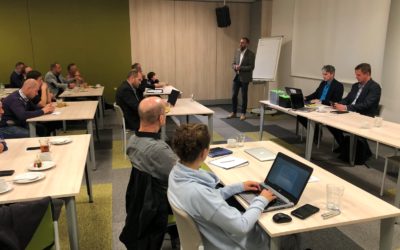The HE3DA lithium nanomaterial battery factory is nearing the start of large-scale production. Venture Club members and other investors we brought on board have already invested over $100 million in the project. CZK. We are therefore taking a close interest in its development. The more advanced stage of the project and the lower level of risk are related to the change in the conditions for new investors to enter. On 22 October, we discussed the new HE3DA and the application of batteries in the electric vehicle industry. Guests of the club were Jaroslav Kučera – CEO and president of Battery Unite, Václav Binar – member of the board of Magna Energy Storage, and Jakub Jedlička – technical visionary and shareholder of Green24.
The use of HE3DA batteries for electric vehicles and charging stations
The field of electromobility is one of the key areas where HE3DA® technology could bring a leap forward. On the one hand, it may eventually offer the missing solution for EV batteries, so it is not surprising that EV manufacturers are interested in the technology. A fast-charging, non-flammable battery would give them a competitive advantage. On the other hand, large-capacity storage consisting of HE3DA cells can help to build EV charging stations faster, even in areas where there is insufficient power on the grid or where the grid is completely absent.
As a demonstration of the utility of HE3DA batteries for automobiles, several applications have been prepared: a 24V starter battery for trucks, use for El Zebra municipal electric vehicles. The HE3DA battery is similar in weight and size to current lead-acid batteries, so switching to their use does not require a change in the body design of small cars. Just replace the battery. The range of such a minicar is then increased by 50%. The clear advantage of HE3DA batteries is the increased safety. “All the technical tests we have carried out confirm the exceptional resistance of our HE3DA batteries to short circuit and fire,” said Jaroslav Kučera. The charging time of the batteries to 70% is currently 15 min. and to 90% they can be charged in 30 min. Faster-charging batteries are planned for the future.
The main applications of HE3DA batteries now include peak balancing in power systems, frequency regulation, islanded grids and stabilization of renewable energy sources. They can be used as back-up power sources from households to large-scale industry.
Challenges for the future of electromobility
Jakub Jedlička from Green24 Holding a.s. participated in the development of the first Czech fast charging station for electric vehicles, called Nikola. These are also used by Škoda Auto on its premises, not only due to their lower purchase price. The charger uses a classical winding transformer and thanks to this has a higher efficiency of up to 98%, while the competition reaches a maximum of 92%. The renowned designer Anna Marešová was involved in its design.
The main issue for the further development of electromobility is the insufficient number and capacity of charging stations, especially if several cars arrive at the same time. Today it is common to have charging stations for two cars, but charging stations for 4 to 8 cars will be needed.
According to Jakub Jedlicka, who owns a Tesla electric car, electric cars have a future thanks to their low operating costs. The owner of an electric car pays only 20 to 30 CZK for 100 kilometres of driving. Service costs are also significantly lower. For example, in four years of operation and 160 thousand km, Tesla uses the original brake pads, the electric car does not need engine oil. The acceleration from 0 to 100 km/h in about 3 seconds is also impressive. The disadvantages of electric cars may be the shorter range and the currently still sparse network of charging stations. However, those who drive tens or hundreds of kilometres a day (which is most of us, let’s face it) and can charge their battery at home or at work are already reaping the benefits of electromobility. He can easily recharge his daily consumption in an hour or two and doesn’t even need a public charging station.
We believe that the launch of HE3DA battery production will contribute to the stabilisation of the electricity grid and to the faster development of electromobility not only in the Czech Republic. We are happy to be there! If you are interested in information about the club or investments in HE3DA battery production, please contact us.

